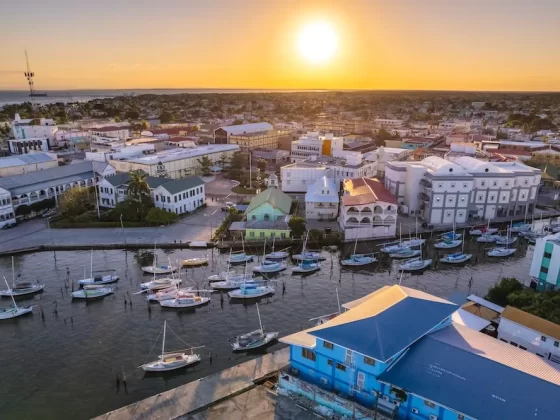Born and raised in cold, gray, and rainy England, I’d always dreamed of escaping to a tropical island—and in 2019, I finally made it happen. As an aspiring freelance writer, I chose Bali for its vibrant digital nomad scene, strong expat infrastructure, and welcoming community.
I spent a blissful year on the Island of the Gods, building my client base while enjoying midday massages, ocean dips, and scooter adventures to temples and beaches. It sounds idyllic—but was it really? Well, buckle up as I share what it’s really like to move to Bali, including the highs, the challenges, and everything I wish I’d known before taking the leap.
What Country Is Bali in?
Before we get started, let’s first answer the most common question: What country is Bali in?
Bali is an island and province of Indonesia, located in Southeast Asia. Often mistaken for a country itself due to its strong cultural identity and international popularity, Bali is actually one of Indonesia’s 38 provinces. Situated between the islands of Java and Lombok, Bali is known for its lush landscapes, iconic rice terraces, vibrant Hindu culture, and world-renowned beaches. As part of Indonesia, Bali uses the Indonesian rupiah (IDR) as its currency and Bahasa Indonesia as its official language, though English is widely spoken in tourist areas. Whether you’re planning a tropical vacation or considering moving abroad, knowing that Bali is in Indonesia is essential for understanding its visa requirements, local customs, and travel logistics.
Here are the top 10 things you need to know before moving to Bali.
#1. Bali Visa Options And Residency
Aside from its tropical feel, sensational surf, and favorable living costs, one of Bali’s greatest appeals is the accessibility of extended visits and longer-term living. Depending on your nationality, Indonesia offers a wide range of visa options, from tourists visiting for a couple of months to remote workers and those seeking residency. Here’s a breakdown of the best visa options if you’re considering moving to Bali:
- C1 Visa: This is a 60-day tourist visa that can be extended twice during your stay to reach a maximum of 180 days (6 months). This is the visa I got when moving to Bali, and although I had to go to the Indonesian Embassy in London to obtain it, I found the peace of mind it gave me was worthwhile. Besides, the embassy visit was quick and painless.
- Remote Worker Visa E33G (KITAS): Are you a remote worker employed by a non-Indonesian company who earns more than $60,000 per year? Good news! You qualify for the Remote Worker Visa, which allows you to live in Bali for up to one year at a time.
- Pre-Investment D12 & Investment E28A Visas (KITAS): If you intend to start a business or invest as a shareholder in an Indonesian company, you can qualify for a Pre-Investment or Investment Visa, which allows you to stay in the country for up to two years.
- Retirement Visa E33E/F (KITAS): If you fancy spending the best years of your retirement amongst the Ubud rice fields or along the shores of Buleleng, over 60’s can apply for a one or five-year visa based on previous income/bank funds and reap the rewards of a lifetime’s hard work.

#2. The Real Cost Of Living In Bali
While the minimum wage in Europe or the U.S. seems barely enough to scrape by these days, you can live on it quite comfortably in Bali. Everything from food to housing and transport is very affordable. It’s possible to eat out for less than it costs to buy and cook your own meals. When I lived in Bali, I ate out and went for drinks almost every day, enjoyed regular day trips, and got weekly massages without stretching my monthly budget.
Read more like this: 12 Top Tranquil Travel Spots for 2025
However, while the standard cost of living on the island is low, it’s easy to overspend on non-essentials. Bali is now populated by bougie European-priced restaurants, Airbnbs, and boutiques that tempt you to indulge. I, for one, gave in all too often on this front. I just can’t resist an aesthetic store—something Bali does better than anywhere else. As long as you have more self-restraint than me, you’ll be fine.
Here’s a round-up of essential and non-essential expenses to help you better understand the cost of living in Bali.
Average monthly expenses:
- Accommodation: < $600
- Food: < $300
- Transport: < $100
Average cost of non-essentials:
- Beer: < $3
- Massage: < $30
- Meal out: $3-$15
- Yoga class: <$10
#3. Immersing Yourself In Balinese Culture
One of the most rewarding parts about moving to Bali is the rich local culture. Traditional Balinese dance and theater are widespread, and from street festivals to cultural shows, you’ll often see men and women performing dressed in traditional costume. This ties into their unique religion, Balinese Hinduism, which includes many vibrant festivities, special traditions, and fun rituals. Everywhere you go, there are reminders of its vibrant culture from huge ornate temples to tiny palm-leaf baskets containing petals, fruits, and incense littering the ground.
Balinese Hinduism’s core belief is in the spiritual connection with Mother Nature. People come from afar to experience this and search for a deeper connection to our Earth through yoga, meditation, and other spiritual/wellness practices. Since these practices were so readily available to me when living in Bali, they became a big part of my lifestyle, and I found myself living more happily, healthily, and presently than I had in other places I’ve lived.

#4. The Reality Of Healthcare in Bali
Let’s talk about the obvious health concern everyone has when coming to Bali, a little thing called “Bali belly”, or traveller’s diarrhea. Unfortunately, due to poor hygiene standards and food contamination, one rarely leaves Bali without experiencing it at least once, no matter how careful you are. Although unpleasant, it usually clears up on its own, but the dehydration it causes can lead to hospitalization in extreme cases.
Apart from that, I didn’t suffer with any health issues when I lived in Bali, so I never had to experience the island’s healthcare firsthand. However, I made sure to secure health insurance before arriving because medical care is expensive for expats, especially if hospitalization is required. For less serious medical needs, there are local clinics that cost around $15 for an appointment. While cheap, the long wait times and language barriers make getting the care you need a bit difficult. For around $30-$40, you can access international clinics and mobile doctors in populated areas like Ubud and Canggu, which are often worth the extra expense. Overall, I felt confident that if I needed medical care in Bali, I would have had easy access and been well taken care of.
#5. Getting Around the Island of Bali
Transportation was my least favorite aspect of moving to Bali and, full transparency, a big factor in why I left. As a small yet highly populated island, traffic is a major issue, especially in the expat hotspots of Ubud, Canggu, and Seminyak. If you live in one of these areas, traffic will be a part of your daily life. However, there are plenty of beautiful places to live in Bali that are much quieter and more relaxed.
Although it’s possible to drive around Bali, the traffic and narrow roads make cars an impractical choice of transportation. Most people opt for a scooter because it offers greater freedom and ease, especially when living somewhere with traffic issues. Renting a scooter is around $100 per month, making it a cheap and accessible way to get around the island. However, accident rates are high, which makes cars a much safer choice.
I’d highly recommend having your own transport when living in Bali, but if you want to avoid the impracticality of a car and the danger of a scooter, it’s possible to get around without it. Ride apps like Grab and Gojeck (Bali’s equivalent of Uber) are readily available across the island, plus they are very reliable and reasonably priced.

#6. WiFi and Workspaces That Work in Bali
As a well-established digital nomad destination, fast and reliable internet is easy to come by, especially in areas with large expat communities like Ubud and Canggu. Knowing that expats and visitors rate accommodation based on internet connectivity, there’s usually a high standard in rental homes, Airbnbs, and other accommodations. I lived in a long-term Airbnb rental on a large complex, and I always had strong internet connection.
There are also a myriad co-working spaces, restaurants, and cafes with excellent WiFi, giving you plenty of choice when finding somewhere to sit and work. However, establishments in more rural and traditional parts of Bali don’t prioritize internet, so don’t expect to connect to WiFi wherever you go.

#7. Working and Doing Business as a Foreigner in Bali
Working in Bali as a foreigner is a complex topic—it depends on what work you’re doing and what visa you have. Certain Indonesian visas allow you to work remotely and do business in Bali. It’s also possible to run a business in Bali by registering it as an “Indonesian foreign-owned limited liability company”, which will provide sponsorship for a business visa.
Starting a business and working in Bali is a great way to obtain residency, but it comes with a unique set of challenges. Firstly, although English is widely spoken, there are instances where language barriers can make doing business more difficult. Secondly, there are cultural differences in Bali when it comes to conducting business. Generally, things are more slow-paced and less organized, words that scare many Westerners away. Thirdly, the business’s ethical and environmental impact on the local community must be considered. Will your business benefit the community, or will it tread on the locals’ toes?
#8. Living With Bali’s Tropical Climate
Bali is a lush, tropical island with average daily temperatures of 80 degrees Fahrenheit year-round—a dream for an English girl like me! It feels so freeing to live in a country where the weather is generally predictable, and you don’t have to worry about wearing the wrong clothes or dealing with drastic daily weather changes. That said, Bali goes through the wet season from November to March, bringing greater humidity and frequent heavy rains that require you to bring a raincoat wherever you go.
Read more like this: Why Living Abroad Works
While tourists prefer to visit Bali during the dry season from April to October, locals and expats embrace the quiet of the wet season. Although frequent rain can get tiring, downpours are often fleeting, and it’s still sunny for most of the day. Plus, the rains bring the island’s nature back to life, making it a great time to enjoy the rainforests and wildlife. Meanwhile, the dry season brings cooler temperatures and ideal conditions for surfing and snorkeling, two of my favorite island activities!
#9. Finding Friends And Building Community in Bali
As an expat in Bali, you’re part of a large, warm, and welcoming foreign community. Although the Balinese lifestyle and culture are ever-present when living on this beautiful island, having a strong foreign presence is helpful and comforting. It provides easy access to information and services that might otherwise be hard to navigate when living abroad.
The community is largely centered around Facebook and WhatsApp groups, each serving a unique purpose. For example, there are groups for digital nomads, solo females, retirees and senior travelers, homeowners, business owners, and more. Not only do they provide an easy, accessible place for info and support as an expat, but they are an excellent place to meet like-minded people.
Moreover, there’s always a full roster of social and business networking events that make it easy to meet people and enjoy a busy, fruitful social life. As someone who moved to Bali without knowing a soul on the island, I believe these groups and events were a blessing. From the moment I arrived, I quickly found a community and left with lifelong friends.

#10. The Environmental Reality of Bali
Sadly, Bali doesn’t have waste management down just yet, and pollution is a huge problem. From roadsides to rivers and even popular tourist beaches, mounds of trash litter the landscape. It’s a sad sight that brings feelings of frustration and helplessness, especially amongst landscapes as beautiful as Bali’s. While it’s hard to live with, it helps to know that many local initiatives are working hard to combat the issue, and I believe Bali’s future is bright.
For me, as an expat living in Bali, it helped to be conscious of my personal environmental footprint and act as a custodian of the land. This meant being mindful of my waste, reducing plastic use where possible, and supporting environmental initiatives.

Is Moving To Bali Really Worth It
I spent one unforgettable year living in Bali and, despite its flaws, every moment felt worth it. One of the biggest draws for me was the quality of life it offered—and it didn’t disappoint. With a low cost of living, I could spend more on the things that brought me joy, rather than worrying about utility bills.
Overall, it was the most fun, healthy, and balanced lifestyle I’ve ever had. I often wonder if I’d still be there if the pandemic hadn’t forced me to leave. While I adored my time on the island, I can admit that the traffic, over-tourism, and environmental issues may have worn me down eventually. That said, I’ve since returned and seen real progress in these areas—promising signs of a bright future for the island, its people, and the global community that calls it home.
If you’re thinking about moving abroad and are looking for information about asset protection, cross-border transactions, second citizenship programs, or global investment, contact Joel Nagel and Nagel Law.
About the Author
Emily Draper is an experienced travel and lifestyle writer and editor from the UK who has written for brands including Culture Trip, Hidden Compass, and tourism boards in Greenland, Luxembourg, and Copenhagen. She has travelled to over 70 countries across all seven continents, now calling Morocco her home.
Contact Author
"*" indicates required fields
Stay Ahead on Every Adventure!
Stay updated with the World News on Escape Artist. Get all the travel news, international destinations, expat living, moving abroad, Lifestyle Tips, and digital nomad opportunities. Your next journey starts here—don’t miss a moment! Subscribe Now!










